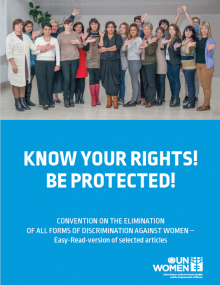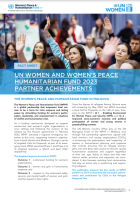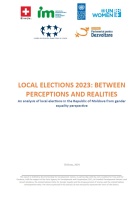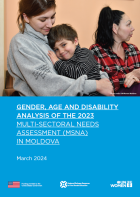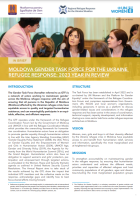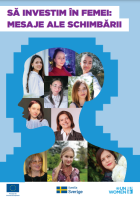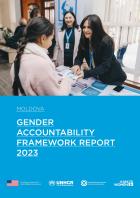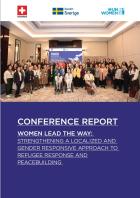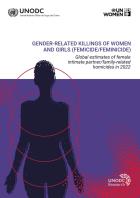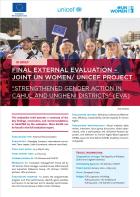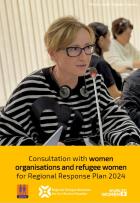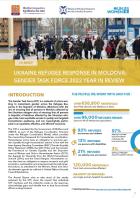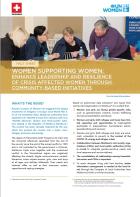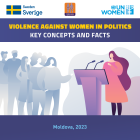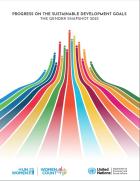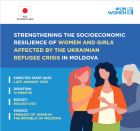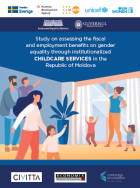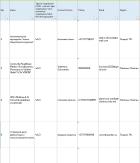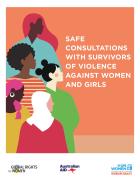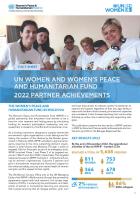1 - 20 of 71 Results
Pagination
Date:
The Women’s Peace and Humanitarian Fund (WPHF) is a global partnership that empowers local women to be a force for crisis response and lasting peace by stimulating funding for women’s participation, leadership, and empowerment in situations of conflict and humanitarian crisis.
As a funding mechanism designed to support women-led and women’s rights organizations in crisis settings and following the invasion of the Ukraine by the Russian government in February 2022, WPHF activated a regional emergency response to the crisis, supporting women’s organizations in both Ukraine and Moldova. Through a series of targeted Calls for Proposals, as part of its emergency track, WPHF launched Phase 1 and Phase 2 of its targeted response in March and April 2022, respectively.
This publication presents the key results of WPHF partners in 2023 to document the successful achievements and contribution by CSOs to the Refugee Response Plan.
Date:
The Centre for Partnership for Development (CPD) has been monitoring parliamentary and local elections for about 15 years, analysing women's representation in elections, voter perceptions, political party funding, etc. with the aim of highlighting the main inequalities in terms of women's and men's participation in electoral processes; society's perceptions of women's presence in political life, etc. As part of the observation mission for the 2023 general local elections, CPD aimed to analyse trends in relation to previous elections.
Date:
Over two years since the escalation of the conflict in Ukraine, the needs of refugee households displaced from Ukraine to Moldova have evolved, in line with the length of their displacement, dwindling resources and a greater need for reintegration support. In mid-2023, a Multi-Sector Needs Assessment (MSNA) was launched in Moldova to provide up-to-date multi-sectoral data about the needs and coping capacities of these households to inform the 2024 Ukraine Situation Regional Refugee Response Plan (RRP). To further assess how needs, coping capacity, and resilience differs for women, men, people with disabilities, and people of different age groups, UN Women conducted a targeted analysis of needs along gender and inclusion lines based on the REACH 2023 MSNA data.
Date:
The Gender Task Force (hereafter referred to as GTF) is a network of actors working to mainstream gender1 across the Moldova refugee response with the aim of ensuring that all persons in the Republic of Moldova (Moldova) affected by the Ukrainian refugee crisis, have equitable access to quality and targeted humanitarian assistance, and can meaningfully participate in an equitable, effective, and efficient response. This Year in Review highlights the accomplishments achieved by the GTF, acknowledges impact and outlines challenges and ways forward.
Date:
In the context of International Women’s Day, UN Women launched an essay writing competition with the subject “INVEST IN WOMEN: ACCELERATE PROGRESS”. The competition was organised with financial support from EU and Sweden. The contest called on Gender Equality Advocates and feminist change-makers around the country to identify ways to invest more in women’s rights and gender equality and motivate why increased investments are needed. In this publication, we have gathered the winning essays of the competition.
Date:
The Gender Accountability Framework (GAF) is an inter-agency tool that helps humanitarian actors track their performance against global commitments to address gender equality and the empowerment of women and girls.
Date:
On October 12–13, 2023, UN Women Moldova hosted an international conference titled “Women lead the way: strengthening a localized and gender responsive approach to refugee response and peacebuilding,” in Chisinau. The conference was organized to provide a platform for both international and national representatives of civil society organizations and coalitions, international organizations, government officials, academics, and other stakeholders to deliberate and contemplate the implementation of the Women, Peace, and Security (WPS) Agenda in the Republic of Moldova (Moldova) and its pertinence within the Humanitarian- Development-Peace (HDP) nexus, particularly in the context of the refugee response and Transnistrian region conflict settlement efforts.
Date:
Violence against women and girls is the most pervasive human rights violation. The gender-related killings of women and girls represent the lethal end point of a continuum of gender-based violence, and they usually follow prior experiences of physical, sexual, or emotional abuse. With the aim of galvanizing global action against this crime, the UN Office on Drugs and Crime and UN Women are publishing this second joint publication with global estimates of gender-related killings of women and girls by an intimate partner or family member, with data from 2022.
Date:
This evaluation brief presents a summary of the key findings, conclusions, and recommendations, as identified by the evaluators. More details can be found in the full evaluation report.
Date:
To inform the planning process of the Refugee Response Plan for 2024, the Platform for Gender Equality, Gender Centru and UN Women organized a series of consultations with women-led (WLOs) and women rights organisations (WROs), as well as refugee women. This consultation sought to promote collaboration among local organisations and refugee women leaders in advancing gender equality within the refugee response in Moldova. This publication is a summary of key findings and recommendations from the consultations, which can be used to inform ongoing and future refugee response efforts in Moldova.
Date:
The resulting report presents key findings and recommendations based on the results of interviews and focus group discussions with 58 Moldovan CSO representatives and front-line professionals carried out in March and April 2023, as well as the results of a survey conducted with almost two hundred CSOs in Moldova from January to February 2023.
Date:
The Gender Task Force (GTF) is a network of actors working to mainstream gender across the Refugee Response in the Republic of Moldova (Moldova) with the aim of ensuring that all persons in Moldova affected by the Ukrainian refugee crisis of ensuring that all persons in Republic of Moldova affected by the Ukrainian refugee crisis, have equitable access to quality and targeted humanitarian assistance, and can meaningfully participate in an equitable, effective, and efficient response.
The Annual Report aims to take stock of the results achieved by the GTF, show the impact that individual GTF members and the collective made on the response, acknowledge gaps and identify how to best focus shared efforts moving forward.
Date:
The 12-month project “Women Supporting Women: Enhance Leadership and Resilience of Crisis-Affected Women Through Community-Based Initiatives” (1 December 2022 – 30 November 2023) will strengthen women’s leadership in fostering dialogue, peacebuilding and social cohesion at the community level on both banks of the river Dniestr/Nistru.
Date:
Women and girls constitute more than half of Moldova’s population, yet they are under-represented in the bodies that make key decisions affecting their lives. As the participation of women in politics has slightly increased, so has the violence against them. In this regard, UN Women Moldova developed a set of informative cards that explain key concepts about the phenomenon of violence against women in politics. Specifically, the set details the forms of violence against women in politics, who are the targets of this phenomenon, and what are the long-term effects of violence against women in politics.
Date:
This publication is the latest instalment in the annual series jointly produced by UN Women and UN DESA. The report provides a comprehensive analysis of gender equality progress across all 17 Sustainable Development Goals (SDGs) and advocates for an integrated, holistic approach to advancing gender equality, involving multistakeholder collaboration and sustained financial backing. Neglecting to amplify efforts and invest in gender parity jeopardizes the entire 2030 Agenda for Sustainable Development.
Date:
Strengthening the socioeconomic resilience of women and girls affected by the Ukrainian refugee crisis in Moldova
Date:
The primary purpose of the study is to provide data and evidence on the costs and benefits of institutionalizing childcare services within the Republic of Moldova to support the development and implementation of the National Programme on childcare for children under 3 years old, as well as policy and legal amendments on family-friendly arrangements in public and private sectors.
Date:
Despite their involvement and critical role in the refugee response, there was no comprehensive overview of the civil society organization ecosystem in Moldova, which left a gap in coordination and synergies critical for an effective humanitarian response. In late 2022, UN Women and UNHCR commissioned a mapping of all local CSOs supporting the refugee response in Moldova, including WLOs, WROs, RLOs and IGs. The objective was to better understand the landscape of service providers, and to identify existing capacities and opportunities to enhance and support their meaningful engagement and participation in the refugee response.
Date:
This guidance provides information, including practical steps, safety measures, and actions that women’s organizations, Government agencies and coordinating bodies can take to incorporate the voices of VAWG survivors into systemic reform efforts, through consultations with survivors. Focus group discussions (FGD) and individual interviews with survivors are often not conducted due to the fear that doing so will re-traumatize survivors. In addition, many who would like to engage with survivors do not do so because they are unsure about appropriate and useful questions to ask survivors.
Date:
This publication presents the key results of WPHF partners in 2022 to document the successful achievements and contribution by CSOs to the Refugee Response Plan.
